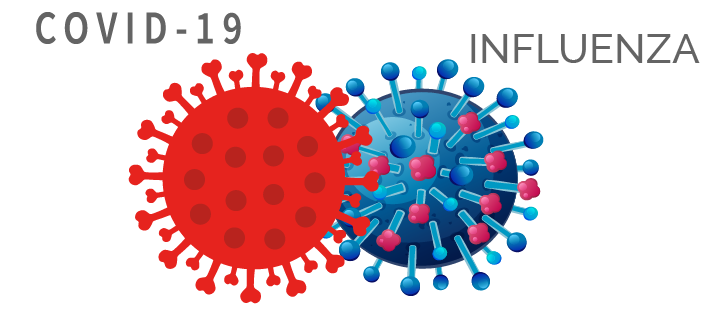
8.25.2020
Influenza and COVID-19
As summer winds down, we need to be preparing for the fall and flu season. Since we will be dealing with COVID-19 infections for some time, we need to carefully determine how to reduce our risk of other infections and the flu is one of the most important to consider.
How many types of flu are there?
Influenza comes in four varieties--influenza A, B, C, and D. Type D affects only cattle, and type C only causes a mild human infection. Types A and B can cause serious human illness and so are the types included in flu vaccines each year. Because both type A and type B are further broken down into smaller sub groups which can change each year, the flu vaccine also changes annually. Currently, each type of flu vaccine is designed to work against 2 types of influenza A and 1 or 2 types of influenza B.
How does the flu vaccine work?
This year, there will be two choices for vaccination, an injection and an intranasal spray. The injection uses pieces (but not the whole virus) of the flu virus to cause our body to develop immunity against the whole virus. Because we are not receiving the whole virus in the injection, it DOES NOT CAUSE FLU. Soreness and pain at the injection site may occur, however. The intranasal spray uses a weakened version of the flu virus to cause us to develop immunity to the “full-strength” version, and may cause runny nose, fever, and sore throat.
Who should get a flu vaccine?
The CDC recommends that EVERYONE aged 6 months and above, including pregnant women, receive a flu vaccine unless they are allergic to one of the components of the vaccine. The flu shot is available for everyone 6 months and above, and the intranasal spray is available for ages 2-49 years (but not for pregnant women). There are also different strengths of the vaccine with specific high dose vaccines for those 65 and older. Based on your age and health, your health care provider will recommend the best form of vaccine for you.
When should you get a flu vaccine?
Since it takes about 2 weeks for your immunity to develop after a flu vaccine, September and October are the recommended months to receive the vaccine to best prepare you for flu season. If you do not receive the vaccine during those months, any time after October that the flu virus is circulating in your community is also acceptable and recommended.
How effective is the flu vaccine?
The effectiveness of the vaccine depends on a number of factors including the person’s age and type of vaccine they receive, and varies from year to year. Over the past 10 years, the effectiveness of the vaccine has ranged from 19-60% at preventing flu. During the 2018-2019 flu season, the flu vaccine was estimated to have prevented over 4 million flu cases, 58 thousand flu hospitalizations, and 3500 flu deaths in the US.
Does the flu vaccine weaken your immune system?
- The flu vaccine trains your body to recognize the influenza virus and fight it more effectively. Getting the flu vaccine will NOT weaken your immune system. On the other hand, if you get influenza, your body’s response to the infection will reduce your ability to fight other infections and you will have a weakened immune system while you are ill and for several days after recovery from the flu.
Why is the flu vaccine so important this year?
This flu season will be unlike any other because we will still be dealing with COVID-19 infections which continue to place a strain on our hospitals and ICUs. Avoiding other infections such as the flu and reducing admissions for the flu will prevent our hospitals from becoming overburdened.
Where can I receive the flu vaccine?
Ask your health care provider’s office or visit the county health department or area pharmacies in Pamlico County. While the flu vaccine is currently available locally, waiting until September or October to receive it will give you the best immunity during flu season.
Can I get the flu and COVID-19 at the same time?
Yes, this has been reported so it’s extremely important to reduce your chances of getting both by practicing the 3 W’s (which will help prevent both COVID-19 and the flu) and by getting a flu vaccine.
What about getting other vaccines during the COVID-19 pandemic?
Children should continue to receive their regularly scheduled immunizations during the pandemic, and adults should ask their health care provider if they should receive vaccination for pneumonia and shingles.
SUMMARY
Flu season is upon us, and COVID-19 season is still with us. Let’s stay safe and healthy during the coming days and include a flu vaccine as one important part of our plan!